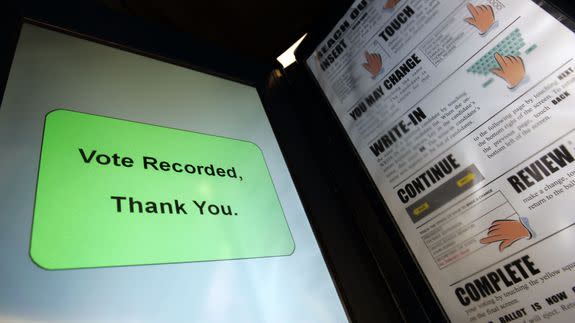Definitely don't freak out over how easy it was to hack this voting machine

Here's a fun fact on the eve of perhaps the most contentious election in recent American history: It's totally possible to hack a voting machine and alter its final tally.
Cylance, a cybersecurity firm, demonstrated a hack against a Sequoia AVC Edge Mk1 machine in a video released Friday. (You can watch it above.) The Sequoia machine uses individual flash memory cards to record votes, which are then stored in the device's internal memory and a "Results Cartridge." Cylance was apparently able to mess with the internal memory and results cartridge using a doctored card, completely changing candidates' names and the number of votes each received.
SEE ALSO: Election day cyberattack: It's coming, but probably won't matter
"We believe that both the public and the appropriate regulatory agencies needed to be made aware of these issues immediately so that appropriate measures could be taken to better secure these voting machines," Cylance CEO Stuart McClure said in a press release.
The company, which claims Sequoia's touchscreen voting machines will be used by more than 8 million registered voters, said it informed Sequoia and "government authorities" about the hack. It's unclear if all of those machines would be vulnerable to this particular hack.
Scary as this all sounds, there's no need to hunker down in the fallout shelter (yet). For one thing, it's not possible to do this hack remotely. A bad actor with knowledge of the exploit — which Cylance obviously didn't publicly release — would have to be physically present at a polling place to tamper with a machine after everyone cast their vote.
There are so many different polling places in the United States that an attack on every electronic Sequoia system seems unlikely at best — especially if authorities have already been reminded to keep an eye on the machines.
Still, this isn't the first time Sequoia machines have come under scrutiny. A 2007 study from the University of California, Berkeley, found that Sequoia units lacked "effective safeguards against corrupted or malicious data injected onto removable media" — exactly the sort of hack discussed here — and the company was quite famously at the center of the 2000 punch card fiasco in Florida.
Authorities should ensure votes are protected, and watchdogs should continue their work to root out potential problems. But don't lose sleep over it this year.
As Mashable has written before, one advantage to having a decentralized and old-fashioned voting system is that it's impervious to a massive hack. The thought of any votes being tampered with is horrifying, but this particular issue is hardly civilization-threatening, especially because few states use this electronic system without backing it up with a paper trail.
